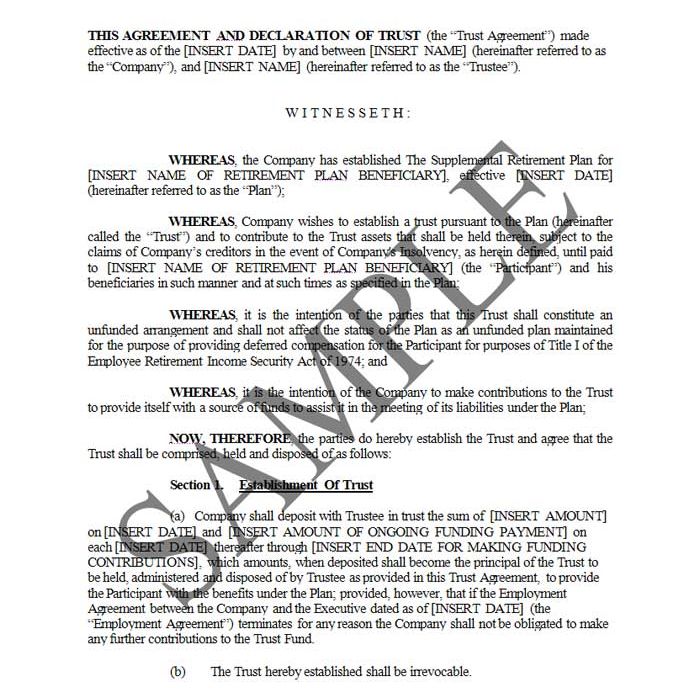Rabbi Trust (10 Pages)
This is a form of a “Rabbi Trust”. It is designed to have an employer create a fund for the benefit of an employee that is set aside in a separate trust for the future benefit of the employee. Note, however, that the trust is very clear that the trust funds are available to the general creditors of the employer at all times that the trust funds have not been paid to the employee. The reason for this is tax-motivated.
This is a form of a “Rabbi Trust”. It is designed to have an employer create a fund for the benefit of an employee that is set aside in a separate trust for the future benefit of the employee. Note, however, that the trust is very clear that the trust funds are available to the general creditors of the employer at all times that the trust funds have not been paid to the employee. The reason for this is tax-motivated. If the funds were set aside irrevocably for the benefit of the employee when they were used to fund the trust, with no risk of forfeiture, the employee would have “constructive receipt” of the funds in the trust, and would be required to pay income tax on the trust funds as they were paid into the trust. Here, the rights of the employee to the trust funds are not fixed, as the creditors of the employer may be paid the trust funds before the right of the employee to the funds matures. Accordingly, the employee is not subjected to income tax on the trust funds until they are received, and the employer is not allowed to claim a tax deduction for the funds allocated to the trust until they are paid to the employee (or to creditors, as the case may be).
The Rabbi Trust is a popular planning technique to give the employee security that absent problems with creditors, funds are set aside by the employer for the employee’s retirement. The employer likes this technique as well, as it provides a way to keep the employee happy and employed, without causing the employer to irrevocably commit funds to the employee until the employee’s actual termination of the employee’s relationship with the employer.
The form acquired its name from the fact that a similar arrangement was used by a congregation to provide a compensation plan for its Rabbi – and the desired tax consequences as described above were approved by the IRS.
Author:
Steven G. Siegel is president of The Siegel Group, a Morristown, New Jersey - based national consulting firm specializing in tax consulting, estate planning and advising family business owners and entrepreneurs. Mr. Siegel holds a BS from Georgetown University, a JD from Harvard Law School and an LLM in Taxation from New York University.
He is the author of several books, including: Planning for An Aging Population; Business Entities: Start to Finish; Taxation of Divorce and Separation; Income Taxation of Estates and Trusts, Preparing the Audit-Proof Federal Estate Tax Return, Putting It Together: Planning Estates for $5 million and Less, Family Business Succession Planning, Business Acquisitions: Representing Buyers and Sellers in the Sale of a Business; Dynasty Trusts; Planning with Intentionally-Defective Grantor Trusts; The Federal Gift Tax: A Comprehensive Analysis; Charitable Remainder Trusts, Grantor Trust Planning: QPRTs, GRATs and SCINs, The Estate Planning Course, The Retirement Planning Course, Retirement Distributions: Estate and Tax Planning Strategies; The Estate Administration Course, Tax Strategies for Closely-Held Businesses, and Tort Litigation Settlements: Tax and Financial Issues.
Mr. Siegel has lectured extensively throughout the United States on tax, business and estate planning topics on behalf of numerous organizations, including National Law Foundation, AICPA, CCH, National Tax Institute, National Society of Accountants, and many others. He has served as an adjunct professor of law at Seton Hall and Rutgers University law schools.
The Siegel Group provides consulting services to accountants, attorneys, financial planners and life insurance professionals to assist them with the tax, estate and business planning and compliance issues confronting their clients. Based in Morristown, New Jersey, the Group has provided services throughout the United States. The Siegel Group does not sell any products. It is an entirely fee-based organization.
Contact the Siegel Group through its president, Steven G. Siegel, e-mail:

